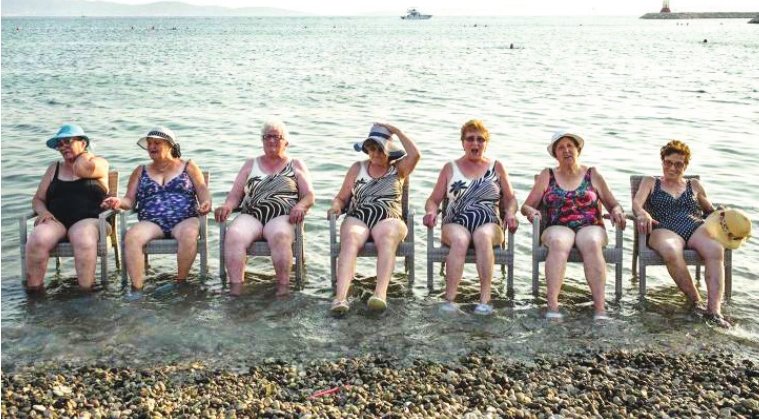
Film festivals seem to love Lansing. Just after Michigan State University’s Latinx Film Festival, and right before the Israeli Film Festival and the larger Capital City Film Festival, comes this weekend’s Italian Film Festival — where two contemporary feature-length films and seven short pictures will be shown.
“We don’t want to show old movies. We want show the movies they are playing in theaters right now, particularly in Italy,” festival organizer and MSU Professor Carmen De Lorenzo said. “The oldest film is from 2015.”
The full-length movies, “Easy” and “Funne, Sea Dreaming Girls,” and the string of short films are part of a larger national event in its 14th year with screenings in cities ranging from St. Louis to Detroit. De Lorenzo expects this first East Lansing edition will act as a jumping-off point for a larger event in the future.
“If we get the Italian Club of Lansing more involved, maybe we can have more screenings in REO Town, Old Town or Grand Ledge,” De Lorenzo said. “That way the community spreads out beyond MSU. Sometimes people feel MSU is too academic. We want this to be for everyone, not just people that study movies.”
Italian film has much to offer. Several of the greatest shifts in cinema were driven by the work of Italian filmmakers. Sergio Leone revived the western with the “The Good, the Bad and the Ugly” and Dario Argento’s “Suspiria” pushed horror to surreal heights that few have reached since.
But, despite the pedigree of their industry, “Easy” and “Funne, Sea Dreaming Girls” aren’t necessarily out to reinvent the wheel. They both deal with social issues facing modern Italy that will resonate with Americans and emigrated Italian-Americans alike. In particular, economic struggle and the widening generation gap.
“We really want people to know how Italy has evolved — who lives now in Italy and how Italy looks,” said De Lorenzo, an Italian language instructor . “For instance, in Italy right now there are a lot of older people, so many of the younger generation are moving out of the country to look for jobs. We have many movies that discuss this new reality of how the older people live.”
“Easy” is described by De Lorenzo as a tragic, or dark, comedy. In Italy this would be known as commedia all’italiana, which translates to “comedy in the Italian style.” It tells the tale of a racecar driver who’s assigned to deliver a coffin from Italy to Ukraine. The body in the coffin belongs to an undocumented migrant worker, which due to its dubious legal status subjects it to a series of misadventures.
“It’s about mortality and the need to escape one’s routine. It crosses boundaries and deals with the questions of borders and the sort of global lives that many of us lead,” said Wayne State University Professor Elena Past, one of De Lorenzo’s fellow organizers.
Past, who studies the Italian film industry and has written a book on the subject, “Italian Cinema and the Environment: Slow Thought, Slow Food, Slow Cinema,” argues the culture of Italian filmmaking gives its individual films a stark personal feel.
“Italian films have smaller budgets and tend to be much smaller productions. A typical film crew in Italy might be only 40 to 50 people, instead of several hundred,” Past said. “The experience of creating a film is a more intimate one.”
Another quirk of the Italian film industry, Past explains, is its several regional film commissions. They operate as sort of reverse gatekeepers, ensuring each region of Italy is represented equally through film.
“The commissions want films that reflect the interests of their region. Italy has an intense regional culture — different foods, different dialects,” Past said. “These commissions lead to films that show off particular people and backdrops you might not find in Hollywood.”
But it goes deeper than just the film commissions. The intimacy of Italian movies is indicative of Italian culture as a whole.
“I teach students to have a different concept of time when they study abroad. Italy has the ‘Slow Food Movement’ that reminds you to spend more time at the table thinking about flavor and conversation,” Past said. “I think Italian film sensibilities is less fast paced with a greater attention to detail.”
De Lorenzo believes Americans have a “romantic” view of Italy that a healthy dose of realism via Italian cinema could dispel.
“Often in the United States we have an image of Italy as filled with rich, elegant people with fancy cars. That is a reality, but only for a minority,” said De Lorenzo. “More Italians live with a happy spirit without having much and their family is always helping them. You can see that in the movies.”
The other feature length film, “Funne, Sea Dreaming Girls,” approaches the more realistic economic situation faced by many Italians living in the countryside, as well as the relationship between younger and older Italians.
“In particular, for the young Italian-Americans it can represent a connection with something that may sound a bit unexpected regarding Italy: Italians who have never been to the seaside in their entire lives,” said director Katia Bernardi and producer Davide Valentini via email.
“But actually this was something quite common for the past generations. We think this is a way for young Italian-Americans to get to know different aspects of the generation of their Italian ancestors.”
Italian Film Festival
Wells Hall, MSU 619 Red Cedar Rd., East Lansing Friday, 7 p.m. showing of “Easy” Saturday, 5 p.m. showing of “Funne, Sea Dreaming Girls” & 7:30 p.m. showing of short films www.italianfilmfests.org
Support City Pulse - Donate Today!
Comments
No comments on this item Please log in to comment by clicking here